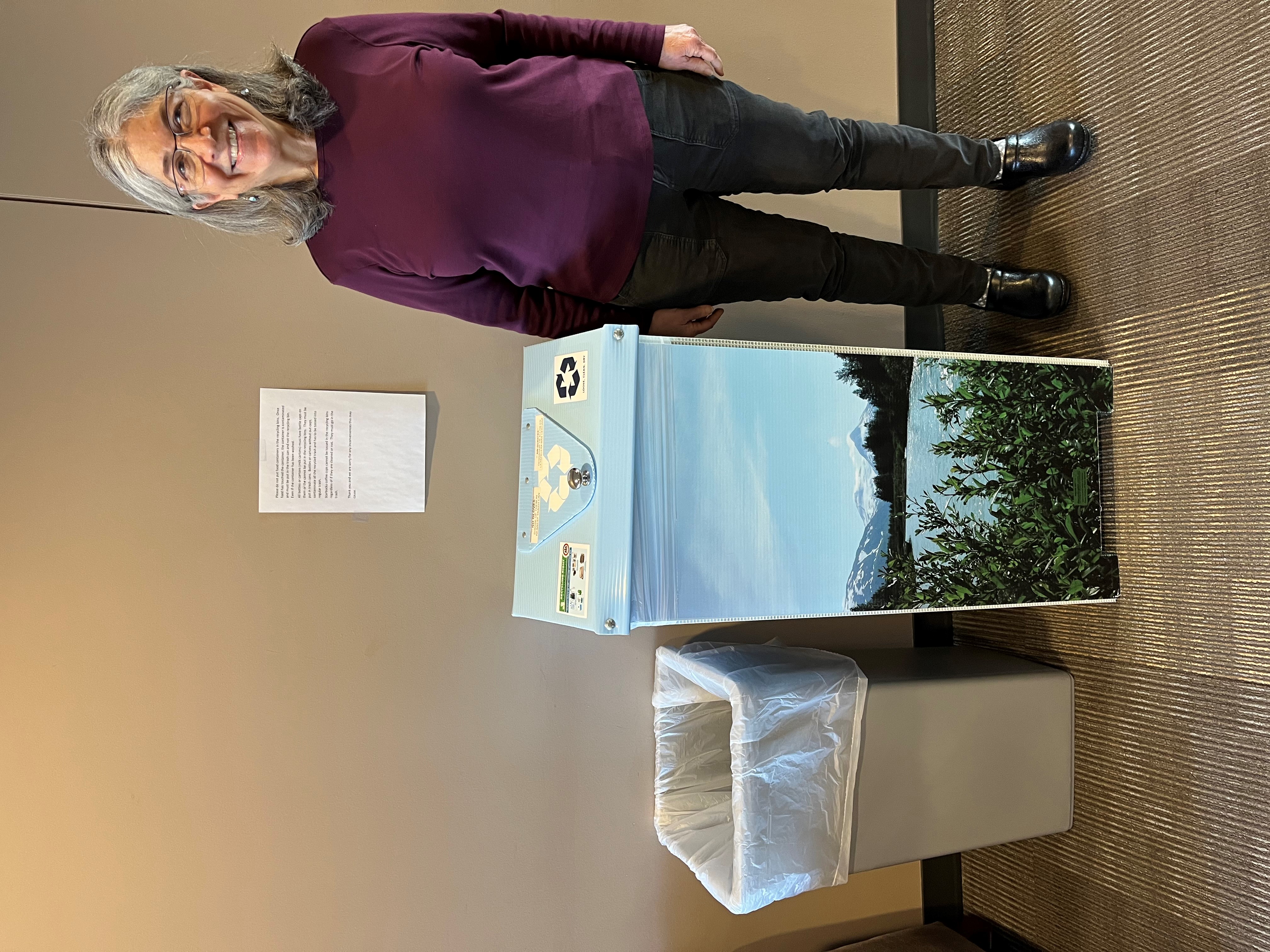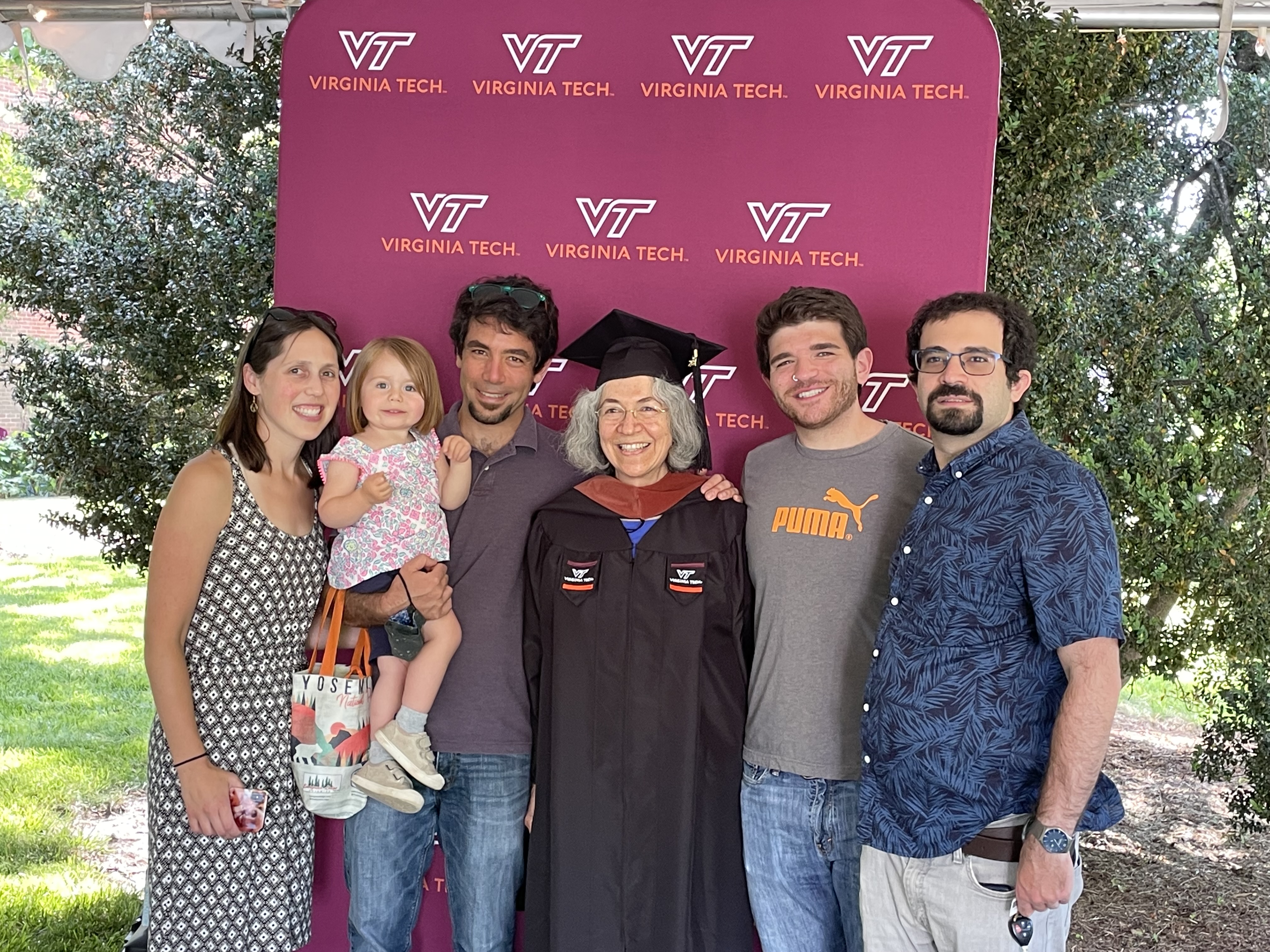MNR alum and 2022 commencement speaker Roxanne Paul launches Earth Day Symposium, new recycling practices on campus
May 24, 2022

By Lindsay Key
When it comes to sustainability, lead from where you are. This is the advice—and legacy—that Virginia Tech Master of Natural Resources (Online) alum Roxanne Paul will leave after her retirement from Virginia Tech in June 2022. On May 15, 2022, Roxanne served as the graduate student speaker at Virginia Tech’s Washington, D.C., Metro Area commencement ceremony, where she highlighted the role that the MNR program has played in her career, personal relationships, and future plans post-retirement.
Since 2014, Roxanne has served as an administrative and program specialist for Virginia Tech’s Northern Virginia Center in Falls Church, VA, supporting various programmatic needs of Washington, D.C.-based faculty and graduate students in the departments of Computer Science and Electrical & Computer Engineering.
Prior to Virginia Tech, and for the majority of her career, Roxanne worked in the natural resources sector. She graduated from Cornell University in 1977 with a degree in natural resources. As a twenty-something, she was a park ranger for the National Park Service, working in Hawai’i Volcanoes National Park and Petrified Forest National Park in Arizona. Later, she worked for the National Wildlife Federation for 14 years, running a national program that helped communities become certified in wildlife habitat development.
But when the program lost funding and she was laid off from that position in 2013, she pivoted to look for other roles. A friend who was a computer science professor at Virginia Tech recommended Virginia Tech as an employer.
Roxanne has loved the opportunity to work with Virginia Tech graduate students. “I have three sons who all went through graduate school,” she explained. “So, in a way, I feel like I can relate to these students, getting their PhD or master's degrees, and I have loved meeting them because they're from all over the world.”
Incorporating sustainability in daily practices
Working in the higher education environment inspired Roxanne to pursue graduate education herself—she used her employee tuition benefit to enroll in Virginia Tech’s MNR (Online) program in 2016. In addition to brushing up on coursework related to climate change, biodiversity, and more, the program has helped her to envision ways to incorporate her passion for environmental sustainability into her day-to-day work.
With her training, it didn’t take her long to recognize some policies that could be changed. “What would bother me is that I'd walk into the computing lab and there would be these big packages of plastic bottled water,” she said. “And then, when I would throw our graduate students pizza parties, I’d notice that the room I had reserved did not even have a recycling bin. And neither did the student café.”
Roxanne knew that a push for a more recycling-friendly culture would start with spreading awareness. She asked the assistant dean of the Northern Virginia Center if she could do an Earth Day presentation for students, faculty, and staff at the center. To her delight, he said yes, and gave her a small budget for the endeavor.

Earth Day is an annual event on April 22 to demonstrate support for environmental protection. First held on April 22, 1970, it now includes a wide range of events coordinated globally by EarthDay.org, including 1 billion people in more than 193 countries.
Roxanne’s first Earth Day symposium at the Northern Virginia Center in 2019—which included a presentation on the history of Earth Day, tips for practicing sustainability, and sustainability-focused door prizes like thermoses and recycled paper products—had the desired effect. She was able to recruit several colleagues to form a Sustainability Committee that would address the shortage of recycling options at the center.
“We made a rule that whenever you reserve a room and food is going to be served, the organizer must provide a recycling container,” she said. The committee also implemented the purchase and placement of recycling containers in more areas of the facility, and specifically chose containers that provided clear explanation on what materials should be included.
Creating a community focused on pro-environmental behavior
Since 2019, Roxanne has hosted an Earth Day symposium every year except for 2020. In 2021, it was conducted virtually, and in 2022 it was accompanied by a potluck vegetarian lunch put on by the Sustainability Committee. In November 2021, she also hosted a hybrid symposium in honor of the United Nations Climate Summit in Glasgow, Scotland, called “Climate Change Diplomacy & How You Can Make A Difference.” The 2022 Earth Day symposium was bittersweet, since it was her last one as an employee.
Her next goal, before she retires, is to create a video about recycling practices in the center that can be shared at orientation for new graduate students, faculty, and staff. She hopes that members of the Sustainability Committee will continue to host the Earth Day event each year and continue to push for improving sustainable practices at the Northern Virginia Center.
Roxanne said that getting to network with colleagues in the MNR program who are like-minded when it comes to environmental values really encouraged her to make a difference. “A major benefit of the program is just learning how to communicate about environmental issues,” she said. “One of my favorite classes taught us how to use social science to present your case in a way that does not offend your audience and that builds trust.”
Although Roxanne has spoken extensively about how much she learned in the MNR program, faculty said they’ve learned a lot from her, too. “It's so humbling working with students as gifted as Roxanne,” said Adam Kalkstein, professor of practice in the MNR program. “Given her diverse skill sets and impressive background, I often feel I'd have more to learn from her than the other way around.”
Having the right words to communicate the facts
During her commencement speech, Roxanne shared a story of how she was able to have a richer discussion with her brother-in-law about climate change thanks to concepts learned in the MNR program. To refute the idea that climate change is human-caused, he had handed her an article that suggested that global warming might be caused by sunspots.
“Back then, I didn’t know how to answer him,” Roxanne explained to the audience. “But now, I could say, ‘Well, you’re right, sunspots are one of the many natural influences on Earth’s climate. In fact, back in the late 1600s to early 1700s, there was a period of very low sunspot activity called the Maunder Minimum, and Europe did experience a mini Ice Age. But scientists at NASA state that while solar activity has been following its usual eleven-year cycles this past century, the net solar activity since 1950 has remained the same while our global temperatures have risen. This rise is because of the higher concentrations of greenhouse gasses in Earth’s atmosphere.”

Retiring but not stopping the work
During retirement, Roxanne plans to continue her work as a climate activist, always on the hunt for new opportunities to raise awareness about environmental issues. “I plan on using my degree to volunteer for an environmental non-profit to give presentations about climate change,” Roxanne explained during her commencement speech. “I wanted to educate people about environmental issues back in 1977, and I still have that same passion today. But now, because of my degree from Virginia Tech, I feel like I really have the knowledge to do so.”


